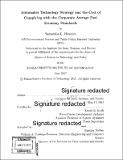Automaker technology strategy and the cost of complying with the corporate average fuel economy standards
Author(s)
Houston, Samantha L
DownloadFull printable version (7.858Mb)
Other Contributors
Technology and Policy Program.
Advisor
David R. Keith.
Terms of use
Metadata
Show full item recordAbstract
In this paper, I examine the question of how the technology choices of automakers, responding to the regulatory obligations placed on them by policymakers, influence the trajectory of technology diffusion and the cost of compliance with CAFE Standards for Light Duty Vehicles (LDVs). Automakers have two main strategies to close the gap between current new vehicle fuel economy and the fuel economy mandated by CAFE: (1) deployment of fuel saving technologies to improve the fuel economy of conventional internal combustion engine (ICE) vehicles; or (2) increasing the share of high-efficiency electric vehicles (EVs) in the sales mix. I develop a model of the LDV fleet to determine the long term CAFE target compatible with limit global warming to two degrees Celsius. I then use this result to study the options for automaker strategy, and I optimize the strategy for both the short term (2012-2025) and long term (2012-2050) compliance cost for two CAFE regulatory regimes. I find that the extent to which automakers use the two main compliance strategies impacts the cumulative cost of complying with the CAFE standards to 2025, the cost of meeting long-term climate change goals, and the pace at which EVs penetrate the U.S. fleet. Specifically, I find that early emphasis on EVs reduces the overall cost of CAFE compliance through 2050 by allowing automakers benefit from time-dependent learning feedbacks. Although the pace of EV penetration into the market varies with automaker strategy, the 2050 market share of EVs reaches or very nearly reaches 100 percent under a 2050 CAFE target that is compatible with limiting global warming to two degrees Celsius.
Description
Thesis: S.M. in Technology and Policy, Massachusetts Institute of Technology, School of Engineering, Institute for Data, Systems, and Society, Technology and Policy Program, 2017. Cataloged from PDF version of thesis. Includes bibliographical references (pages 73-75).
Date issued
2017Department
Massachusetts Institute of Technology. Engineering Systems Division; Massachusetts Institute of Technology. Institute for Data, Systems, and Society; Technology and Policy ProgramPublisher
Massachusetts Institute of Technology
Keywords
Institute for Data, Systems, and Society., Engineering Systems Division., Technology and Policy Program.